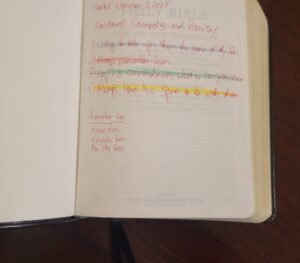I have actively been studying the ordinance of the sacrament for several years. As part of that study, I have read the standard works (the Bible, Book of Mormon, Doctrine and Covenants, and Pearl of Great Price), with the specific goal in mind to better understand the sacrament. In my next several posts, I am going to write about my experience and briefly summarize what I have learned.
Members of the Church of Jesus Christ of Latter-day Saints take the sacrament every week in sacrament meeting.1 The sacrament was established by the Savior on the final night of his mortal ministry,2 and he instituted it when he visited the American continent as a resurrected being.3 In this dispensation, the ordinance of the sacrament was introduced in conjunction with the organization of the church.4 “The ordinance of the sacrament makes sacrament meeting the most sacred and important meeting in the church.”5
Why? Why does the Lord want us to partake of the sacrament on a weekly basis? Why are our Sunday worship services focused on the sacrament? Frankly, I believe those questions are answered line upon line, as we continually study to try and understand the gospel of Jesus Christ.
In the next several posts, I hope to provide some answers based on what I’ve learned. The primary purpose of this post is to talk about my experiences that led me to make the sacrament a subject of study.
My calling as a bishop
My journey studying the sacrament began when I was called to serve as the bishop of my ward in May, 2016. My stake president met with me and my wife to extend the call, and during that first meeting he said, “your most important responsibility as bishop will be sacrament meeting and the sacrament.”
I didn’t think much of that comment at the time, as I was too shocked to really think of much. But as the days, and weeks, and months passed, and I learned more about the responsibilities of a bishop,6 I reflected more and more on my stake president’s comment that my most important responsibility was sacrament meeting and the sacrament.
Covid
We all know what happened in 2020 when the COVID-19 pandemic changed life as we know it.7 I was still serving as a bishop at the time, and was surprised that in March, 2020, the Church cancelled all meetings.8
As the presiding priesthood holder in the ward, the bishop holds the priesthood keys and authority to authorize the admininstration of the sacrament, and that includes authorizing priesthood holders to administer the sacrament to members of the ward who may be “unable to partake of the sacrament because they are confined to a home, care center, or hospital.”9 Because the Church had cancelled all meetings, including sacrament meetings, bishops were instructed to authorize worthy priesthood holders to administer the sacrament in their homes on Sundays.
As a side note, the Church’s General Handbook, which has been revised from time to time, now includes a provision that appears to have been created as a response to the COVID-19 pandemic: “In rare circumstances, sacrament meeting might not be held for an extended time. In these situations, a bishop may authorize worthy priesthood holders in his ward to prepare and administer the sacrament in their homes each Sabbath. Bishops may also authorize them to prepare and administer the sacrament to ward members who do not have priesthood holders in their homes.”10 This is what happened in 2020 while Sunday meetings were cancelled.
As we worked to inform the members of our ward about the cancellation of meetings and the authorization to administer the sacrament in their homes, I felt an anxiety11 to do everything I could to ensure that the sacrament would be administered properly and in a manner that would be appropriate for that sacred ordinance. I spoke with many priesthood holders, I sent emails with instructions regarding how to administer the sacrament, and I asked priesthood holders to read the instructions in the General Handbook regarding how to properly administer the sacrament.12
It was an interesting experience for me, serving as bishop during the covid pandemic. I pondered frequently on my stake president’s counsel that “sacrament meeting” and the “sacrament” would be my most important responsibilities. The anxiety I felt over the proper administration of the sacrament caused me to ponder even more deeply why sacrament meeting and the sacrament were my most important responsibilities.
My study project
As a result of pondering the significance of the sacrament for an extended period of time, I decided to start a study project to try and learn more. So I bought a new set of scriptures and created a system to mark passages that pertained to the sacrament.
The sacrament prayers contain three covenants: “they are willing to take upon them the name of thy Son, and always remember him and keep his commandments which he has given them.”13 It then has one promise: “that they may always have his Spirit to be with them.”14
I picked a color for each covenant, and one color for the promise. In the front of the book, I wrote down the covenants and the promise, and which color represented each: blue for the covenant to be willing to take upon ourselves the name of Jesus Christ, red for the covenant to always remember him, green for the covenant to keep his commandments which he has given us, and yellow for the promise that we may always have his Spirit to be with us.


I started reading this set of scriptures in November, 2020, and I finished in November, 2023. Over these past three years, as I read the scriptures I was constantly thinking about the sacrament. By highlighting passages of scriptures that pertained to the sacrament covenants and the sacrament promise, I saw that the sacrament can teach us how to follow the Savior in any circumstance.
The sacrament prayers contains basic principles
In a prior post, I have discussed how the Savior taught using principles (see my post “The Doctrine of Christ“). I believe that the three covenants we make when we take the sacrament are fundamental principles that represent everything God has asked us to do to follow Christ. Every principle of the gospel of Jesus Christ, every commandment, every teaching, every law, fits within one or more of those three covenants. And every promise that God has made to us, every blessing, is reflected in the promise that we may always have his Spirit to be with us.
These three covenants can be filters through which pass all thought, all emotion, every desire of our heart. We can use these three covenants as a type of measurement to judge our actions and determine what choices will bring us closer to Christ. As we ponder these covenants, they can help us to bring our lives into harmony with God’s will. Every day, every hour, every minute, as we keep these covenants at the top of our minds, we will be guided by the Holy Ghost to know how to live the gospel of Jesus Christ.
Example: Remember Him
As I was studying the sacrament, and frequently pondering those three covenants, I had an experience that helped me see how these covenants can teach us how to live the gospel of Jesus Christ.
As an attorney working in civil litigation, I frequently deal with conflict. I was working on a particularly contentious case, and the opposing counsel and I would sometimes have less than courteous phone conversations. During one of those calls, I was feeling a frustration with the whole situation, and I was about to tell the opposing counsel exactly what I thought. As I was about to launch into a verbal attack on this attorney, two words came to my mind: “remember him.”
The mind is an amazing thing, especially when inspired by the Holy Ghost. As I heard those words (although I didn’t really “hear” them as I would another person speaking), I was able to pause without much of a break in the conversation and I tried to catch hold15 of that thought. I knew that the thought came to me by the Holy Ghost, and so I tried to focus on it. As I did, there came to my mind the Savior’s words from the Sermon on the Mount:
“I say unto you, Love your enemies, bless them that curse you, do good to them that hate you, and pray for them which despitefully use you, and persecute you.”16
As I thought of those words, I knew the Savior was not pleased with how I was feeling, and with what I was about to say. So I tried to change. I tried to be different during that conversation. I can’t say the conversation went well, but it went much better than it was about to.
At the end of the phone call, I felt remorse about the way I had acted toward this attorney. But at the same time, I felt that the Savior was pleased with my effort to change during that phone call. It was an amazing experience for me. I was thinking on all the ways I had acted contrary to the Savior’s teachings, and yet in that moment, through the Holy Ghost, I felt that the Savior acknowledged my effort and let me know I had done well. How could that be? What I felt from the Savior in that moment was taught by Elder Holland: “With the gift of the Atonement of Jesus Christ and the strength of heaven to help us, we can improve, and the great thing about the gospel is we get credit for trying, even if we don’t always succeed.”17 The Savior had prompted me to think of the covenant in the sacrament prayer, and he was pleased that I had tried to change when I felt his correction.
This simple example showed me how the covenants that we make when we take the sacrament can guide us in everything we do. Not only can we think of these covenants as principles to teach us how to follow the Savior in any circumstance, but as we make an effort to live those covenants we will have help through the Holy Ghost. The Lord will be with us, he will teach us, he will comfort, watch over, protect, strengthen, and importantly, he will correct.
As I received correction from the Lord, I felt his love perhaps even more strongly than in moments when I sought his comfort. The Lord has said, “whom I love I also chasten that their sins may be forgiven, for with the chastisement I prepare a way for their deliverance in all things out of temptation, and I have loved you.”18 In that moment, I felt his chastisement in a way that encouraged me to be better. And I believe I was able to recognize his correction, and I was willing to try and change, because I was making a conscious effort to live the covenants I made when I took the sacrament.
Do we understand the significance of the sacrament?
In 2019, when our Sunday meetings were reduced to two hours instead of three, Elder Holland taught, “our modified Sunday service is also to reduce the complexity of the meeting schedule in a way that properly emphasizes the sacrament of the Lord’s Supper as the sacred, acknowledged focal point of our weekly worship experience.”19
President Dallin H. Oaks has taught that it is through the sacrament that we can remain unspotted from the world:
“How can we have the Spirit of the Lord to guide our choices so that we will remain ‘unspotted from the world’ (D&C 59:9) and on the safe path through mortality? We need to qualify for the cleansing power of the Atonement of Jesus Christ. We do this by keeping His commandment to come to Him with a broken heart and a contrite spirit and in that wonderful weekly meeting partake of the emblems of the sacrament and make the covenants that qualify us for the precious promise that we will always have His Spirit to be with us (see D&C 20:77).”20
The sacrament is a tremendous gift. It can provide the answers for how we can receive all the blessings offered to us by the Savior, but only if we study, ponder, and live the covenants we make when we take the sacrament. Studying the sacrament over these past years has changed me, and in the next several posts I hope to share at least a glimpse of what I have learned.
References
- General Handbook, “Sacrament Meeting,” The Church of Jesus Christ of Latter-day Saints, Salt Lake City, Utah, 2023, 29.2.1, https://www.churchofjesuschrist.org/study/manual/general-handbook/29-meetings-in-the-church?lang=eng&id=title_number4-title4#title_number4. ↩︎
- Matthew 26:26-28; Mark 14:22-24; Luke 22:19-20. ↩︎
- 3 Nephi 18:1-11. ↩︎
- Doctrine and Covenants 20:75-79. ↩︎
- Elder Dallin H. Oaks, “Sacrament Meeting and the Sacrament,” Ensign, November 2008, 17, https://www.churchofjesuschrist.org/study/ensign/2008/11/sacrament-meeting-and-the-sacrament?lang=eng&id=p8#p8. ↩︎
- To read about the many responsibilities of a bishop, see the General Handbook, “The Bishop and His Counselors,” 7.1, https://www.churchofjesuschrist.org/study/manual/general-handbook/7?lang=eng&id=title_number2-title2#title_number2. ↩︎
- “The COVID-19 Pandemic has altered human existence’s political, environmental, and economic elements, which affect psychological growth and sustainability. This impacts people’s living standards and quality of life,”, Saira Naseer, et al. “COVID-19 outbreak: Impact on global economy.” Frontiers in public health vol. 10 1009393, 30 Jan. 2023, https://www.ncbi.nlm.nih.gov/pmc/articles/PMC9923118/#:~:text=The%20COVID%2D19%20Pandemic%20has,the%20early%202020’s%20(30). ↩︎
- “As the rapid spread of COVID-19 continues across the globe, the First Presidency and Quorum of the Twelve Apostles announced Thursday afternoon that all Church gatherings—including public worship services and sacrament meetings, stake conferences, leadership conferences, and stake, branch, or ward activities—will be suspended immediately. The announcement included no end date,” Church News, “In Response to Coronavirus, First Presidency Suspends Church Gatherings Worldwide,” March 12, 2020, https://www.churchofjesuschrist.org/church/news/in-response-to-coronavirus-first-presidency-suspends-church-gatherings-worldwide?lang=eng. ↩︎
- General Handbook, “Approval to Administer the Sacrament,” 18.9.1, https://www.churchofjesuschrist.org/study/manual/general-handbook/18-priesthood-ordinances-and-blessings?lang=eng&id=p109#p109. ↩︎
- General Handbook, “Approval to Administer the Sacrament,” 18.9.1, https://www.churchofjesuschrist.org/study/manual/general-handbook/18-priesthood-ordinances-and-blessings?lang=eng&id=p248#p248. ↩︎
- My use of the word “anxiety” is specific, and is likely different from how the world is discussing “anxiety” as an emotional disorder. Lehi said that the “anxiety of his soul” was for his children to “remember to observe the statutes and the judgments of the Lord.” 2 Nephi 1:16. The prophet Alma wished “great anxiety even unto pain” that his people would “not procrastinate the day of [their] repentance.” Alma 13:27. ↩︎
- General Handbook, “The Sacrament,” 18.9, https://www.churchofjesuschrist.org/study/manual/general-handbook/18-priesthood-ordinances-and-blessings?lang=eng&id=title_number27-title28#title_number27. ↩︎
- Doctrine and Covenants 20:77. ↩︎
- Doctrine and Covenants 20:77. ↩︎
- When Alma recounted his conversation experience to his son Helaman, he said, “I remembered also to have heard my father prophesy unto the people concerning the coming of one Jesus Christ, a Son of God, to atone for the sins of the world. Now, as my mind caught hold upon this thought, I cried within my heart: O Jesus, thou Son of God, have mercy on me, who am in the gall of bitterness, and am encircled about by the everlasting chains of death.” Alma 36:17-18. ↩︎
- Matthew 5:44. ↩︎
- Elder Jeffrey R. Holland, “Tomorrow the Lord Will Do Wonders among You,” Ensign, May 2016, 126-127, https://www.churchofjesuschrist.org/study/ensign/2016/05/sunday-afternoon-session/tomorrow-the-lord-will-do-wonders-among-you?lang=eng&id=p12#p12. ↩︎
- Doctrine and Covenants 95:1. ↩︎
- Elder Jeffrey R. Holland, “Behold the Lamb of God,” Ensign, May 2019, 45, https://www.churchofjesuschrist.org/study/ensign/2019/05/28holland?lang=eng&id=p12#p12. ↩︎
- Elder Dallin H. Oaks, “Sacrament Meeting and the Sacrament,” Ensign, November 2008, 20, https://www.churchofjesuschrist.org/study/ensign/2008/11/sacrament-meeting-and-the-sacrament?lang=eng&id=p31#p31. ↩︎
